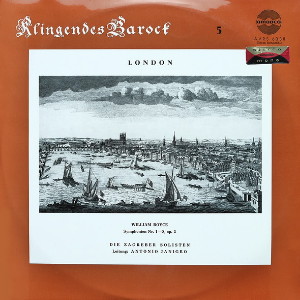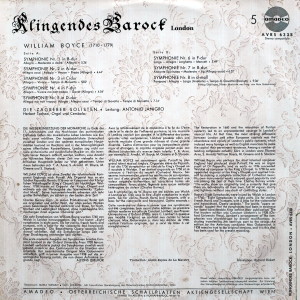 |
1 LP -
Amadeo AVRS 6338
|
 |
|
| LONDON -
Klingendes Barock - 5 |
|
|
|
|
|
| William Boyce
(1710-1779) |
|
|
| Symphonie Nr. 1
in D-dur |
5' 26" |
A1 |
| - Allegro
Moderato e dolce - Allegro |
|
|
| Symphonie Nr. 2
in A-dur |
4' 44" |
A2 |
| -
Allegro assai/Adagio - Vivace -
Preso (Allegro) |
|
|
| Symphonie
Nr. 3 in C-dur |
5' 02" |
A3 |
| -
Allegro - Vivace - Tempo di
Minuetto |
|
|
| Symphonie
Nr. 4 in F-dur |
4' 54" |
A4 |
| -
Allegro - Vivace ma non troppo -
Gavot (Allegro) |
|
|
| Symphonie
Nr. 5 in D-dur |
7' 14" |
A5 |
| -
Allegro ma non
troppo/Adagio/Allegro assai -
Tempo di Gavotta - Tempo di
Minuetto |
|
|
| Symphonie Nr. 6
in F-dur |
5' 49" |
B1 |
| - Largo -
Allegro/Larghetto - Menuett |
|
|
| Symphonie Nr. 7
in B-dur |
6' 52" |
B2 |
| - Andante
Spirituoso - Moderato - Jig
(Allegro assai) |
|
|
| Symphonie Nr. 8
in d-moll |
9' 36" |
B3 |
| - Pomposo/Allegro
- Largo (Andante) - Tempo di
Gavotta (Risoluto) |
|
|
|
|
|
| Herbert Tachezi, Orgel
und Cembalo |
|
| DIE
ZAGREBER SOLISTEN |
|
| Antonio
Janigro, Leitung |
|
|
|
|
|
Luogo
e data di registrazione |
|
Grossesaal,
Musikverein, Vienna (Austria) -
1965
|
|
|
Registrazione:
live / studio |
|
studio |
|
|
Edizione LP |
|
AMADEO
- AVRS 6338 - (1 lp) - durata 48'
37" - (p) 1966 (?) - Analogico |
|
|
Altre edizioni
LP
|
|
VANGUARD
"The Bach Guild" - BSG 70668 - (1
lp) - (p) 1965
PHILIPS-VANGUARD
"World Record Club" - T 866 -
(1 lp) - (p) 1969
VANGUARD
"Historical Anthology of Music"
(The Bach Guild) - HM-23 SD - (1
lp) - (p) 1973
|
|
|
Edizioni CD |
|
VANGUARD
CLASSICS - 08 9055 71 - (1 cd) -
(c) 1992
VANGUARD CLASSICS "Historical
Anthology of Music" (The Bach
Guild) - 08 2037 71 - (1 cd) - (c)
1994
VANGUARD CLASSICS "Everyman" - 08
6115 71 - (1 cd) - (c) 1996
OMEGA RECORDS GROUP Inc. "20bit
Digital" - SVC-46 - 1 (cd) - (c)
1996
|
|
|
Note |
|
Stereo
compatible
|
|
|
|
|
The
Restoration in 1660 and the
relaxation of Puritan
austerity led to an
unprecedented upsurge in London's
musical life. At that time,
the most striking difference between
London and other European
capitals was the abundance
and variety of London's
public concerts, which
induced many foreign as
well as English musicians
to make the capital their
permanent residence. Among
a number of leading
composers actually born in
London were Thomas arne,
S. Arnold, William Boyce,
M. Greene and S. Storace.
William
Boyce was perhaps the
most talented composer
England had produced
since Purcell. He was an
organ pupil of Dr
Pepusch's, and as early
as 1736 succeeded Weldon
as composer to the
King's Chapel. In 1758
he was appointed
organist at the King's
Chapel and applied
himself to making a
complete collection of
Cathedral music. His
own instrumental works
enjoyed great
popularity and are
among the best of
their time. Charles
Burney wrote: "His
works show an
originality and a
sincerity that give
them an individuality
all their own, full of
vigour, clarity and
lightness without any
clash of confiicting
styles..."
Boyce
Eight Symphonies
were issued by Walsh
in London in 1760:
"Eight Symphonies in
eight parts. Six for
violins, French
Horns and Trumpets,
with a bass for the
violoncello and
harpsichord. Opera
seconda." The words
"opera seconda"
suggest that the
symphonies had been
in existence for
some considerable
time before their
publication. The
fist moder edition
was Constant
Lambert's in 1728
(Oxford University
Press). Lambert's
arrangement of the
symphonies was
characterised by
drastic
modifications,
including
transferring the
continuo part to the
strings. An edition
by the American
conductor Max
Gobermann in 1938
remains true to the
original versions,
and it is this that
has been used for
the present
recording.
Alfons Übelhör
(Translation:
Richard
Rickett)
|
|

